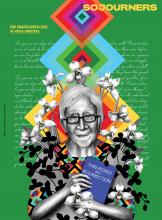HISTORICALLY, THEOLOGY HAS worked a lot like Reaganomics. Those with access to academic ivory towers get to theorize about God and spiritual meaning. Often, watered-down versions of these theories reach the rest of the population through pastoral care professionals and the few thinkers and writers who strive to make theology accessible.
One of the primary goals of activist theology, described by theologian Robyn Henderson-Espinoza in their new book Activist Theology, is to reverse this flow of meaning-making. The work of activist theology “is to invest in community, so that knowledge production is not top down from the academy but begins on the ground to move to the middle and tip the top.”
What does it mean to “tip the top?” Ideally, a revolution.
This starts with recognition of how social and political systems of oppression are supported by what the author calls “theologies of white supremacy” and Christian supremacy. There is a long history of theological systems that have exposed these issues, such as queer, womanist, mujerista, and liberation and black liberation theologies.
Read the Full Article

